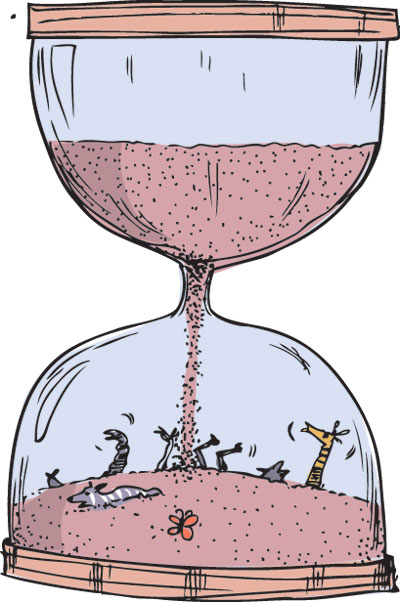Reply To:
Name - Reply Comment
 n the afterglow or should we say the aftermath of World Animal Day last Saturday, we need to ponder deeply on the latest World Wildlife Fund (WWF) report which warns that the overall number of mammals, birds, reptiles, amphibians and fish had declined by 52 percent between 1970 and 2010. The main culprits are humans, all of us, who have been wiping out animals through hunting or slaughter, fishing, deforestation, pollution and various forms of habitat destruction.
n the afterglow or should we say the aftermath of World Animal Day last Saturday, we need to ponder deeply on the latest World Wildlife Fund (WWF) report which warns that the overall number of mammals, birds, reptiles, amphibians and fish had declined by 52 percent between 1970 and 2010. The main culprits are humans, all of us, who have been wiping out animals through hunting or slaughter, fishing, deforestation, pollution and various forms of habitat destruction.
According to the shocking and shameful report this calamity if not catastrophe is happening mainly in poor or tropical countries such as Sri Lanka. The report does not specifically mention Sri Lanka, but media exposures in recent years have grimly portrayed the fate of our animals including the majestic elephants. They are given a prominent place in peraheras, but are being left to suffer and die, specially during this year’s drought while some heartless racketeers with political backing are even abducting these priceless animals for sale. With Government leaders boasting of unprecedented development ranging from international ports and airports to superhighways, the habitats of these animal species are being drastically reduced. Selfish and wicked human beings, mainly political leaders, rob the habitats of the animals, and like self-righteous humbugs, we brand the animals as rogues.
The WWF’s 2014 Living Planet report gives an index that tracks the numbers of animals in selected populations of vertebrates across the world. Even the 3,038 vertebrate species included in the report are just a fraction of the estimated 62,839 species that have been described around the world, the National Geographic Magazine reports.
Freshwater animals, like frogs, show the biggest drops in the index, with an average decline of 79 percent. Populations of land-dwellers like the African elephant have plummeted by 30 percent. Marine species declined 39 percent, with the biggest losses in the tropics and the oceans off Antarctica - especially among marine turtles, many shark species, and large migratory seabirds such as the wandering albatross.
Wildlife populations are dwindling most rapidly in the world’s tropical regions, according to the report. The tropics have seen a 56 percent reduction in the index of  more than 3,000 populations, which include 1,638 species, over the past 40 years.
more than 3,000 populations, which include 1,638 species, over the past 40 years.
Latin America, home to many low-income countries, has borne the brunt of animal loss, with a dramatic decline of 83 percent cited in the report.
The Living Planet report is the world’s leading, science-based analysis on the health of our planet and the impact of human activity. Knowing we only have one planet, WWF believes that humanity can make better choices that translate into clear benefits for ecology, society and the economy today and in the long-term.
This latest edition of the Living Planet report is not for the faint-hearted. One key point that jumps out is that the Living Planet Index which measures more than 10,000 representative populations of mammals, birds, reptiles, amphibians and fish, has declined by 52 per cent since 1970.
Put another way, in less than two human generations, population sizes of vertebrate species have dropped by half. These are the living forms that constitute the fabric of the ecosystems which sustain life on Earth - and the barometer of what we are doing to our own planet, our only home. We ignore their decline at our peril.
We are using nature’s gifts as if we had more than just one Earth at our disposal. By taking more from our ecosystems and natural processes than can be replenished, we are jeopardizing our very future. In a world where so many people live in poverty, it may appear as though protecting nature is a luxury. But it is quite the opposite. For many of the world’s poorest people, it is a lifeline. Importantly though, we are all in this together. We all need nutritious food, fresh water and clean air - wherever in the world we live.
Things look so worrying that it may seem difficult to feel positive about the future. Difficult, certainly, but not impossible - because it is in ourselves, who have caused the problem, that we can find the solution. Now we must work to ensure that the upcoming generation can seize the opportunity that we have so far failed to grasp, to close this destructive chapter in our history, and build a future where people can live and prosper in harmony with nature.
According to the WWF, we are all connected - and collectively, we have the potential to create the solutions that will safeguard the future of this, our one and only planet.